In This Article
Pigmentation on Nose: Causes, Types & Best Treatments
While pigmentation on the face is a common phenomenon for many, nothing can be more frustrating than noticing a gray-brown patch on your nose. Several factors can cause pigmentation on the nose. However, there are advanced treatments that can help you get rid of the discolouration, giving you long-lasting results. If you are uncertain about what is causing this condition, this article is for you. In this ultimate guide, we will learn everything about pigmentation on the nose, including its causes, treatments and prevention tips. Let us get started.
In This Article
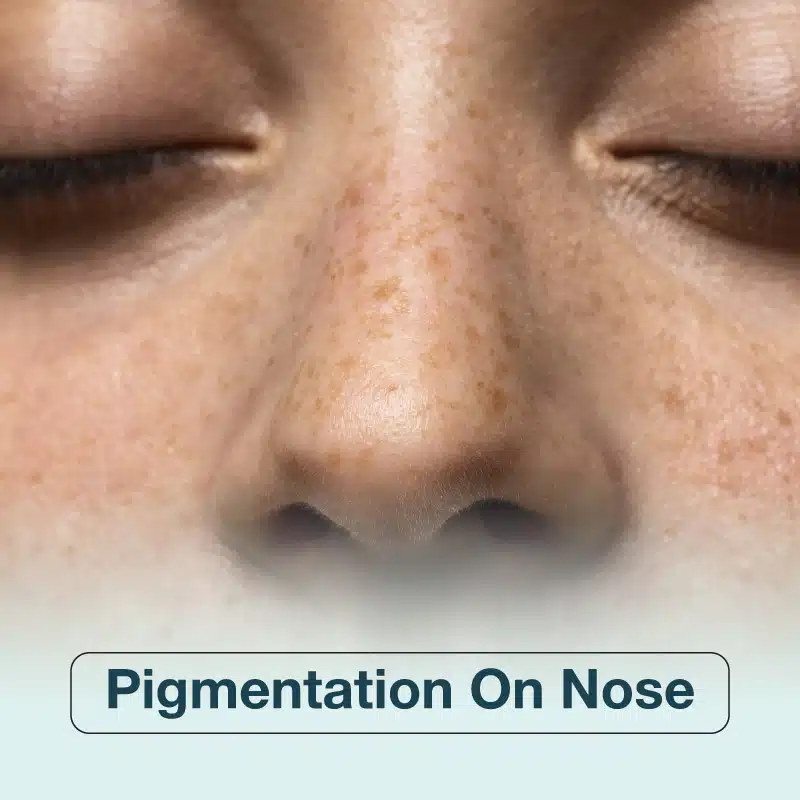
What Is Pigmentation On The Nose?
Pigmentation on the nose refers to the discolouration or darkening of skin on and around the nose due to overproduction of melanin. It is a common concern often seen in many, irrespective of age or skin type. It can be caused by several factors, which are manifested as dark spots or patches.
What Causes Pigmentation On The Nose?
There are several reasons for pigmentation around the nose. Identifying the exact cause is the first step to effective treatment. Here is a rundown of the causes of pigmentation on the nose:
- Sun Exposure (UV Radiation): Our face is the most exposed area to sunlight, with the nose being the most prominent part. The harmful UV rays [1] from the sun stimulate melanin production, causing hyperpigmentation on your nose. This sun-induced pigmentation often appears as dark spots or patches on and around your nose.
- Post-Inflammatory Hyperpigmentation (PIH): Post-Inflammatory Hyperpigmentation [2] or PIH is a condition where your skin darkens as a response to inflammation, injury, blisters, burns or acne. You may notice pigmentation due to acne you might have had around or on your nose.
- Hormonal Changes: Hormonal fluctuations often trigger melanin production in your body, resulting in pigmentation. Pigmentation on the nose is most common during pregnancy, and this condition is called melasma. [3] Other factors that stimulate hormonal disorders, such as birth control pills, menopause, or hormonal therapy, also contribute to pigmentation on the nose.
- Age Spots: Sun spots or age spots can cause pigmentation on the nose because of long-term exposure to the sun’s UV rays. This triggers an increased production of melanin, resulting in dark spots. These get more prominent with ageing. [4]
- Certain Medications (Photosensitising Drugs): Pigmentation on or around your nose can be a side effect of specific drugs or medicines that you may have used. Using antibiotics, chemotherapy drugs or hormonal therapy medicines can trigger overproduction of melanin, resulting in pigmentation.
- Genetic Predisposition (Freckles): Genetics [5] can be another contributing factor to pigmentation on the nose. If there is pigmentation in your family history, then you are more likely to get it too.
Treatments For Pigmentation On The Nose
Several treatments are available to address pigmentation on the nose. These include:
-
Topical Treatments:
Depending on the severity of your pigmentation, your dermatologists may recommend topical medications, like creams, lotions or serums. These products contain potent ingredients that help minimise the appearance of pigmentation and give you an even tone.
-
Chemical Peels:
Chemical peels are a professional treatment to address the pigmentation on the nose. This involves applying chemical solutions of different concentrations to remove the top, damaged and pigmented layer, revealing a new skin beneath.
-
Laser Treatments:
Laser Toning is a non-surgical pigmentation treatment that your doctor may recommend for you. In this procedure, the dermatologist uses a laser beam to target the melanin in your skin and break it down into fragments, which are later eliminated by your body’s lymphatic system. They use advanced Q-switch laser technology for this procedure to ensure safety, accuracy and long-lasting results.
-
Natural Remedies:
Some individuals may find relief from natural ingredients like aloe vera, turmeric, green tea extract and others. Hence, they opt for these home remedies as a gentler solution and to avoid chemicals. Moreover, these are accessible and affordable, too.
-
Nutrition Suggestions:
Your dermatologist may give you dietary suggestions, such as the essential vitamins and minerals you need to include in your daily diet. These nutrient-rich foods help control the production of melanin and reduce pigmentation by lightening your skin and dark spots.
-
Lifestyle Changes:
You may be asked by your dermatologist to make some changes to your lifestyle that will help reduce pigmentation. These include sun protection, protective clothing, avoiding picking or scratching dark spots, using gentler skincare products, eating a balanced diet, staying hydrated, and managing stress.
Preventing Pigmentation On The Nose
Pigmentation on the nose can be prevented, although it is not possible to avoid pigmentation caused by genetics. Here are some preventive measures to follow that will help protect your skin from factors that trigger or worsen pigmentation:
- Protect your skin from the sun by applying a sunscreen with an SPF of 30 or higher daily, regardless of the weather. Use protective clothing such as brimmed hats to avoid sun exposure.
- Avoid using harsh skincare products that can irritate your skin and lead to PIH. Instead, opt for non-abrasive cleansers and be gentle when applying them to your skin.
- If you have pigmentation on your skin due to hormonal disorders or are prone to it, try maintaining your hormone levels.
- Eat a balanced diet rich in essential nutrients like vitamins, minerals, and antioxidants that help regulate melanin production and lighten your skin.
- Use skin-lightening products as prescribed by your dermatologist, as they will help fade the hyperpigmentation on your nose.
- Keep your skin hydrated by drinking plenty of water and using appropriate moisturisers.
When To See A Dermatologist?
While pigmentation itself is not harmless, it needs to be treated. You may need a professional’s help to treat the condition if you notice any of the following changes:
- Your pigmentation patches on or around the nose start to change in colour, size or shape.
- Your pigmentation on the nose does not seem to get any better, or it worsens despite a consistent skincare routine and regular sun protection.
- If you notice redness, itching, irritation, inflammation, pus or pain in the pigmented area.
- If you suspect hormonal disorders, injury or any autoimmune condition as the triggers or underlying causes for pigmentation.
- If you are uncertain about the types of pigmentation.
- A dermatologist will ascertain the actual cause, type and severity of pigmentation on the nose and recommend a suitable treatment that delivers the best results.
Takeaway
Pigmentation on the nose, although not a serious medical concern, is a cosmetic concern that can impact your appearance. There are several professional treatments available to help lighten pigmentation. If you are uncertain about the cause and type of treatment you may need, seek a professional’s help immediately. The dermatologists at Oliva are well-experienced and knowledgeable, and they will diagnose the root cause and recommend a treatment plan tailored to your needs. For a targeted approach and a personalised treatment, book your consultation with our expert doctor today!
Frequently Asked Questions On Pigmentation On Nose
Yes, pigmentation on the nose is very common and usually caused by sun exposure, hormonal changes, or acne marks.
Yes, mild pigmentation may fade naturally with sun protection and regular skincare. However, for deeper pigmentation, you need a professional treatment.
It usually depends on the severity and the underlying cause of your pigmentation, and the recommended treatment type. Typically, it can take about 4–8 weeks.
Yes, Vitamin C helps brighten your skin and lighten the dark spots by reducing melanin production.
Yes, you can temporarily mask pigmentation effectively by using a good concealer or colour corrector.
Professional treatments like laser toning, chemical peels, or topical medications prescribed by a dermatologist can effectively reduce pigmentation.
Read This Next
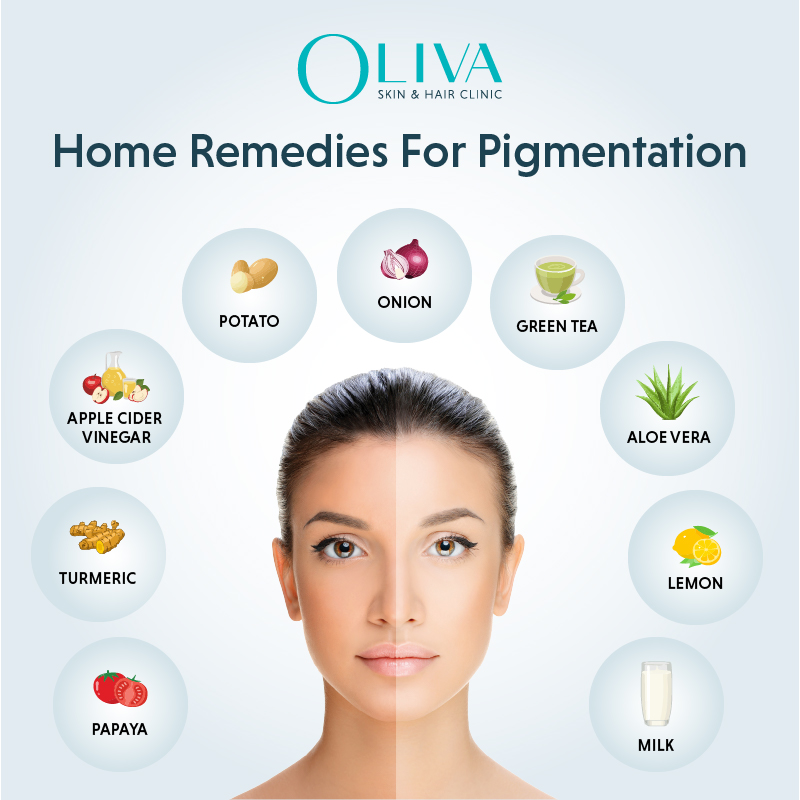
How To Remove Pigmentation From Face Permanently & Naturally At Home?

How to Remove Dark Spots Caused by Pimples: Dermatologist-Approved Solutions
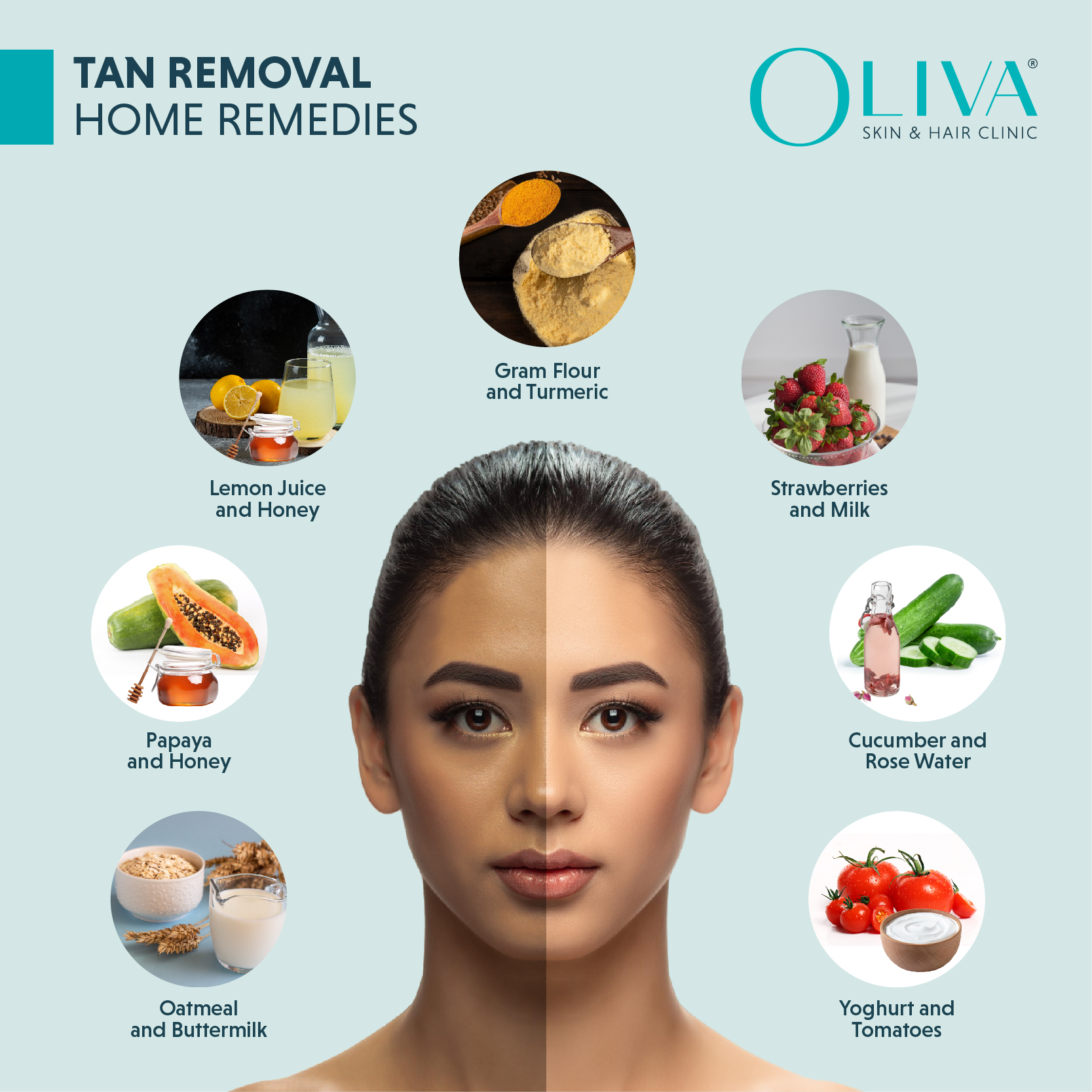
20 Simple Home Remedies For Sun Tan Removal – Natural Ways
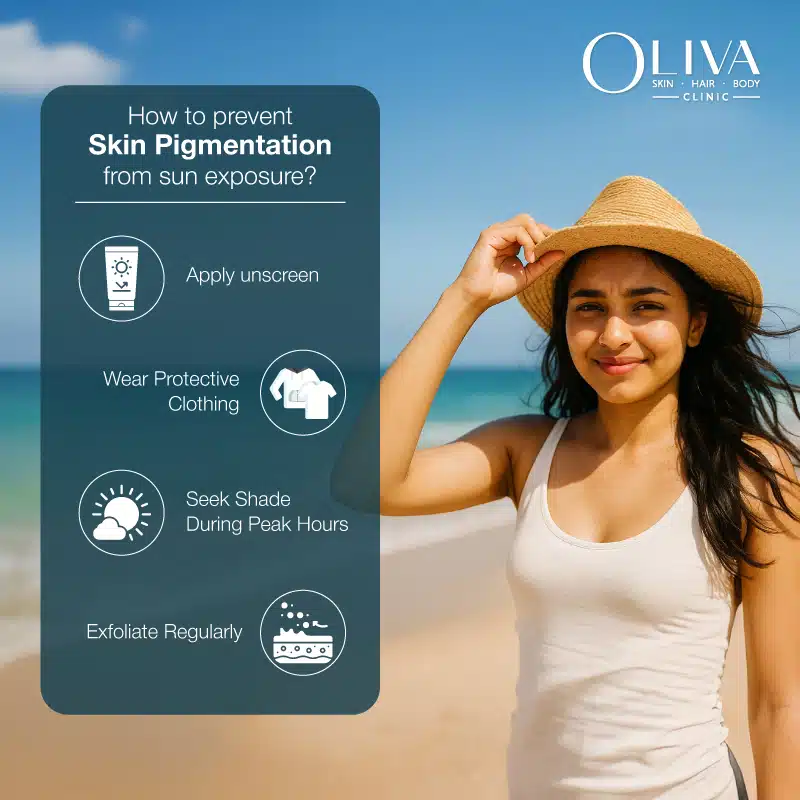
Skin Pigmentation Due to Sun Exposure: Causes, Treatments & Prevention
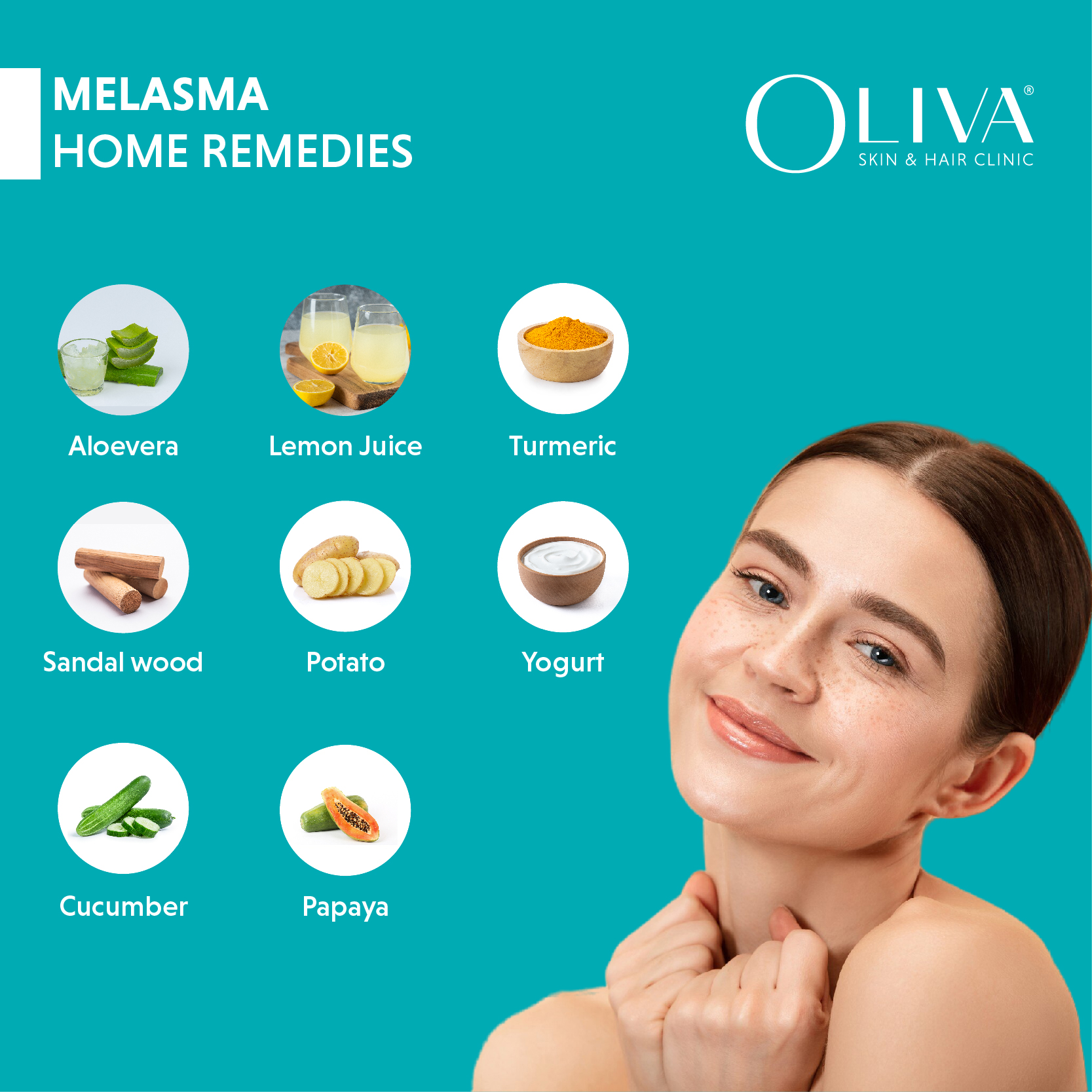
10 Proven Home Remedies for Melasma: Aloe Vera, Turmeric, Lemon Juice & More




